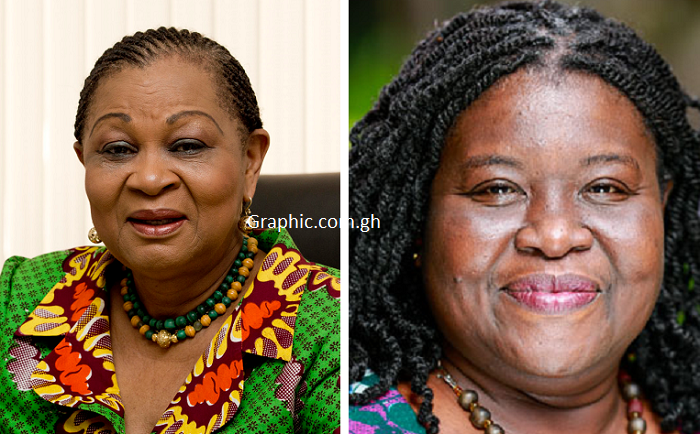
The woman who saw tomorrow
On Wednesday, March 8 when the world celebrated its women, there were two names I wanted to hear or read about in the media. One of them was not only mentioned but was actually on air granting interviews.
Advertisement
She is Dr Joyce Aryee, the woman who as CEO of the Chamber of Mines, softened mining, stripping it of boulders (ore) and dynamites.
The second name among my favourite women did not feature in any bulletins or interviews - predictably, not even a word! But it was predictable because I know that even if the journalists had gone after her, she would have declined the invitation, especially if it was to profile her personality. I know it: I have tried it for two years, and failed. That is why I am doing this piece without her prior knowledge. It is my tribute to female scholarship and dynamism.
That woman is Professor Rose Emma Mamaa Entsua-Mensah, Deputy Director-General of the Council for Scientific and Industrial Research (CSIR). Some of her own colleagues at the CSIR may not know she is a professor! Can’t blame them, though. The CSIR not being an academic institution, the title Prof. is not bandied around much. With over 100 publications and books to her credit, what many do not know is that between 2006 and 2008, she lectured as an Associate Professor at the University of Cape Coast. Earlier in 2005, she was a visiting scholar at the University of Tennessee, Knoxville.
I don’t intend this to be a profile except to mention that Mamaa holds a B.Sc. in Zoology and an M.Sc. (Aquatic Biology) both from the University of Cape Coast. Her Ph.D. in Fisheries Science is from the University of Ghana.
Mamaa eats research and is renown nationally and internationally for her extensive work on lagoons and fresh water bodies. A one-time Chair of the Freshwater Specialist Group for West Africa, she was among the few African scientists involved in the Millennium Ecosystem Assessment from 2004-2005. She sits on the board of the World Fish Centre.
In March 2012, she received an Excellence Award for Scientific Research in Fisheries Science by the Ministry of Women and Children in Ghana. In September 2012, the University of Cape Coast named her among its distinguished alumni. In October 2013, the South Africa based international group, Creating Excellence in Organisations conferred on her the award of Africa’s Most Influential Woman in Agricultural Research for her work in Fisheries. She is a Fellow of the Ghana Academy of Arts and Sciences.
I have not gone one-quarter of the way into her CV; actually, as indicated earlier, today’s piece is not intended to profile this precious lady about whom the Fantes of Ghana would say, “indeed, this is a woman whose bicep is heavy”.
I am minded to remember Mamaa on this occasion because she is a prophet. Many years ago, long before galamsey assumed the proportions of a national threat, this lady was one of a handful of researchers and advocates who foresaw, researched into and forewarned that life in Ghana could come to a stop if nothing was done to stop the threat that mining, in general, galamsey, in particular and even salt winning posed to our water-bodies.
Her findings were presented only recently (2015) in her Inaugural Lecture at the Ghana Academy of Arts and Sciences. Since then, there is no conference, workshop or seminar at which Mamaa would miss an opportunity to repeat the warning about “galamsey”.
Aside galamsey, here are some of her observations and warnings:
“One particular threat to the coastal wetlands in Ghana that requires special attention is salt production, resulting in “a gradual increase in the destruction of mangroves for salt winning....For instance, mud flats used to be filled with flood waters in the rains and there was more acreage for fish development and growth. Now, the mud flats have been replaced by saltpans”.
Looking at discharges from domestic and industrial effluents from inland, as well as sewage outfall at the infamous Lavendar Hill (near Korle Bu hospital, Accra), she cried out against the practice, concluding that “Indeed, THE KORLE IS GHANA’S CESSPOOL OF SHAME”.
She took one critical look at oil exploitation in Ghana and asked the powers-that-be a simple but prophetic question: “If ever there is an oil spill on the scale that happened in the Gulf of Mexico, do we have a contingency plan?”
Though many years ago, Mamaa’s prophetic voice was shrill, mainly at conferences and workshops against Illegal mining in the Pra, Offin, Anum and Birim rivers. She cites the mass mercury poisoning in Minimata Bay in Japan resulting from the consumption of toxic fish in the 1950s and 1960s. Result: “The inhabitants suffered from a lot of neurological disorders.”
How much louder must a prophet shout to be heard!
As one of the few prophets in the world who have been honoured in their own home, Prof. Entsua-Mensah has had the satisfaction of seeing some of her dreams come true in her lifetime. The CSIR College of Science and Technology is (to quote one of her colleagues) “Mamaa’s baby. She pushed for it”.
She is not credited directly with the CSIR-Plus, but she is a happy scientist knowing that at long last there is such an outfit to market products from inventions of local scientists.



